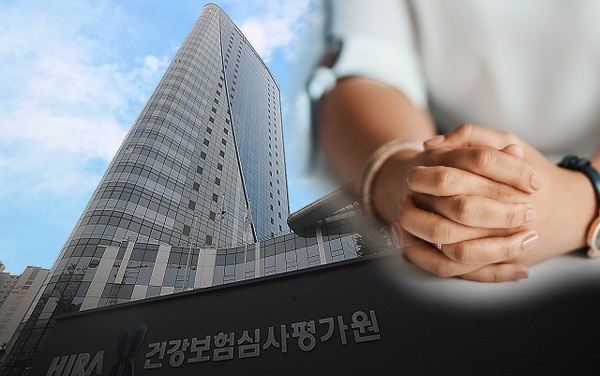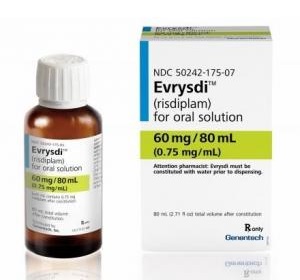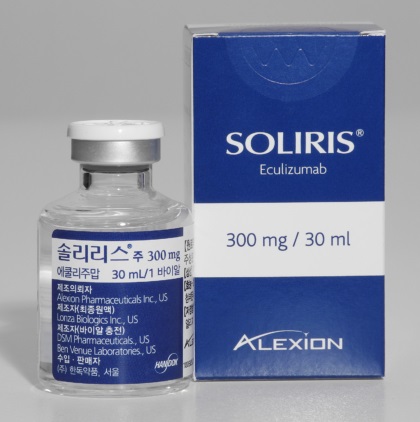[New drugs waiting for reimbursement ②] Evrysdi & Soliris
A factor as important as efficacy and safety for a new drug is its access. No matter how a new drug improves survival and side effects, it is a pie in the sky if patients cannot use the medicine. The easiest and hardest way to increase a new drug’s access in Korea is its national health insurance registration. Once a drug is registered, patients’ financial burden falls to one-twentieth of its initial price. However, the government examines it “meticulously,” as it must consider the insurance’s finance. That gives rise to new drugs tied up in the registration process for years after product approvals, worrying patients. Kora Biomedical Review examined the status of these new drugs in two installments. – Ed.

Evrysdi, the only oral SMA treatment worldwide
Here is a case in which patients' treatment options and companies' business rights have been put on the back burner. That is the story of Evrysdi (risdipiplam), the spinal muscular atrophy (SMA) treatment developed by Roche.

Roche won approval from the Ministry of Food and Drug Safety to use Evrysdi to treat 5q SMA in November 2020 and submitted an application for its insurance benefits to Health Insurance Review and Assessment Service (HIRA) in July 2021. However, the agenda item regarding Evrysdi’s reimbursement has yet to be tabled on its drug evaluation committee until April 2023.
Considering a rule that obligates the committee to discuss an application to HIRA within 150 days of receiving it, Evrysdi’s screening has been put off for nearly two years.
Coincidentally or not, behind the delay in Evrysdi’s reimbursement discussion is Spinraza (nurinursen), developed and marketed by Biogen. Spinraza is the first SMA treatment worldwide, which won approval from the Korean regulator in January 2018 and began to receive insurance benefits in April 2019.
Evrysdi has the same mechanism and indication as Spinraza. Accordingly, if there are no problems with efficacy and drug-pricing negotiation, there are few reasons for not being registered on the insurance list under the current reimbursement standards.
However, problems arose when Biogen applied to expand its reimbursement standards at the end of 2021. Biogen requested Spinraza's reimbursement standards from the current type 3a patient to the entire type 3 patient.
Spinraza’s maintenance therapy costs up to 300 million won ($228,000) per person a year. As a result, HIRA judged it needed to devise a follow-up management plan for SMA treatments to secure the insurance’s financial health. Therefore, as the agency reviewed the expansion of Spinraza’s reimbursement standards, it also began to discuss follow-up standards for maintaining or suspending administration.
That naturally postponed the discussion on Evrysdi’s reimbursement with the same indication after completing the discussion of follow-up standards. HIRA said it would apply Spinraza’s expanded standards to Evrysdi.
The problem is Spinraza and Evrysdi use different administering methods. Unlike Spinraza, which requires spinal cord injection, Evrysdi is a syrup that can be taken orally.
Evrysdi is an essential treatment option for patients who cannot receive spinal cord injections due to scoliosis common to SMA. Still, the indefinite delay in reimbursement is undermining patients’ treatment options.
Worse yet, the discussion on the follow-up reimbursement standards, which had entered the concluding stage, recently showed signs of additional delays due to strong opposition from a disabled people’s organization, and complaints from patients waiting for Evrysdi are also mounting.
“It is desirable for HIRA to register oral treatments according to the current standards to ensure treatment options as early as possible and continue sufficient discussions on Spinraza’s follow-up standards on maintaining or suspending administration,” said Moon Jong-min, who heads an organization of SMA patients. “This is time for the authorities to listen to the desperate appeals of patients who direly need new oral treatment options.”
The delay in reimbursing Evrysdi can also be subject to criticism for infringing on pharmaceutical companies’ business rights. As Roche sees it, the company has failed to release the drug for nearly two-and-a-half years after winning approval from the regulator.
Evrysdi’s reimbursement registration was completed within a year of approval in all the A8 drug price reference countries – the U.S., Germany, Italy, France, the U.K., Switzerland, Canada, and Japan.
Soliris, the last bastion of severe NMOSD patients
A new drug has come out to treat neuromyelitis optica, a rare disease that can lead to permanent blindness unless treated on time. Soliris (eculizumab) has won approval for the first time to treat neuromyelitis optica spectrum disorder (NMOSD), which causes irreversible neurological damage, impaired vision, and loss of vision due to the inflammation of the optic nerve and spinal cord.

Soliris won the Food and Drug Safety Ministry’s approval for its indication for neuro myelitis optica in February 2021, and Handok Pharmaceutical, the drug’s marketer, submitted a reimbursement application to HIRA in October of the same year. However, the agenda has failed to be tabled at the drug evaluation committee’s meeting for one-and-a-half years.
At the time, Handok applied for setting reimbursement standards for treating neuromyelitis optica (terminal administration of third or more) that recurred after two or more recurrences after rituximab administration. There are three to five patients annually with an estimated annual treatment cost of 500 million won.
However, HIRA reportedly proposed to set the reimbursement standard at “fourth or more” treatments instead of the “third or more” treatments as applied by the pharmaceutical company.
As it happened, mycophenolate mofetil (MMF), an oral treatment used in the preceding state, began to receive reimbursement while reviewing Solaris’ application, pushing the latter’s use to later stages.
Last November, HIRA reimbursed patients who show side effects or no responses to azathioprine or children and adolescents (aged 2-18) with anti-MOG antibody-related diseases with recurrences during steroid treatment.
In addition, the agency revised the reimbursement standard of rituximab that had been applied to the treatment of neuromyelitis optica since 2017 to “cases that show side effects or no responses to azathioprine or oral MMF treatments.”
As MMF pills were registered as secondary treatment, rituximab was virtually pushed to tertiary treatment, which, in turn, pushed Solaris’ treatment stage to fourth and more.
The problem was one of the preceding treatments had the indication of treating neuro myelitis optica in their approved contents. In other words, MMF pills and rituximab were applied with reimbursement for reasons beyond approval.
Even if patients treat neuro myelitis optica with immunosuppressive therapies, 25-60 percent experience continuous recurrence, as recurrence repeats, prognoses get worse, causing damage to the brain, optic nerves, and spinal cords, leading to long-term disabilities.
Accordingly, the primary target of neuromyelitis optica is preventing recurrence. Soliris proved significant recurrence prevention effects in patients who experience recurrence repeatedly despite treatments with immunosuppressive therapies through the phase 3 clinical trial of PREVENT study.
A treatment option that proved clinical efficacy in pertinent disease through phase 3 clinical trial and is the only one with an indication for approved content has been pushed to latter-stage treatment. However, considering Soliris is a hyper-expensive drug, it is next to impossible for patients to use it without insurance benefits in the early stage.
Soliris is expected to be tabled at the drug evaluation committee’s meeting before long, along with the setting of reimbursement standards for preceding treatments, HIRA will unlikely be able to avoid criticism for its lack of evidence-based evaluation and fairness and equity.
Related articles
- [Special] Long-waited drugs were approved, but patients must wait for insurance benefits
- SMA patients protest inconsistent reimbursement standards for Spinraza
- Samsung Bioepis obtains European Commission approval for Soliris biosimilar
- Oral SMA drug Evrysdi passes reimbursement review
- Spinraza’s reimbursement depends on proving continuous motor function
- Negotiations to expand coverage of Spinraza and Evrysdi end dramatically

